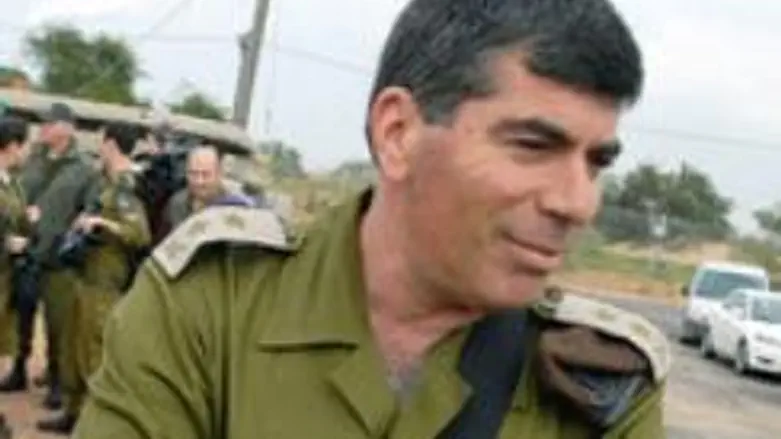
Twenty-nine convicted terrorists were finally released early Tuesday afternoon to Gaza despite moral objections raised at the last moment by IDF Chief of Staff Lt.-Gen. Gabi Ashkenazi. The 29 were supposed to have been freed on Monday, together with 57 other terrorists released to Judea and Samaria.
All 96 terrorists are all named as members of the Fatah organization and were released as a "goodwill" gesture hoping to prop up Fatah Chairman Mahmoud Abbas, for the Muslim month of Ramadan.
The release of the 29 was postponed on Monday for what authorities initially said were "technical" reasons. However, the news media quickly learned that the true reason for the delay was apparently the objections raised at the last minute by Ashkenazi in a letter he sent to Prime Minister Ehud Olmert and Defense Minister Ehud Barak.
Ashkenazi wrote that the release of prisoners to Gaza was problematic "in terms of moral values
IDF Radio quoted the Prime Minister’s Office as saying that Ashkenazi “is not the government's morality officer.”  " as long as IDF Cpl. Gilad Shalit is still being held in Gaza. He added that he was aware that there were other, diplomatic considerations behind the decision and that the government had the right to decide as it saw fit.
" as long as IDF Cpl. Gilad Shalit is still being held in Gaza. He added that he was aware that there were other, diplomatic considerations behind the decision and that the government had the right to decide as it saw fit.
Some reports said the Defense Ministry transferred Ashkenazi's letter to President Shimon Peres, whose signature is required for releasing the prisoners, along with other documents pertaining to the release. Peres then reportedly asked that each of the individual prisoners' cases be reviewed individually before their release, causing the one-day delay.
President Peres said Tuesday regarding the release of the Gaza prisoners that he had faced "no dilemma" in signing it. "I have to check everything legally… and it took more time than I had thought," he said. When asked if Ashkenazi's letter had influenced him, he said, "There are many influences, not just one. There are also diplomatic considerations. There were no pressures on me."
Politicians and anonymous political sources did not react uniformly to Ashkenazi's action; some criticized him and others backed him up.
IDF Radio quoted the Prime Minister’s Office as saying that Ashkenazi “is not the government's morality officer.” Other political sources voiced "wonder" at Ashkenazi's letter. They asked why it was only written t
The soldiers told the photographer to slow down and when he failed to do so, shot him in the legs. hree days before the release date and noted that the Chief Military Prosecutor signed a document approving the release.
hree days before the release date and noted that the Chief Military Prosecutor signed a document approving the release.
Defense Minister Barak said Tuesday that sending the letter was "a legitimate action" by Ashkenazi.
Another senior source in the Prime Minister's Office said "there are people trying to drive a wedge and create discord between Olmert and Chief of Staff Ashkenazi." The source insisted that the relationship between the two is one of "full trust." The source said that the release was fully coordinated with the defense establishment and that the Defense Minister backed it from start to finish.
MK Ran Cohen (Meretz) said Tuesday that Ashkenazi was "out of line" in sending the letter. "It's not his business to address the moral issue of freeing prisoners," Cohen, a former IDF colonel, said.
Welfare and Social Services Minister Yitzchak Herzog (Labor) said that Ashkenazi had every right to send the letter, and that he was even obligated to do so. "He prepared and wrote a letter as part of the pardon process, and ultimately the political tier is authorized to sign the pardon. They are the ones who need to make the decision," he told IDF Radio..
MK Ephraim Sneh (Labor), a former Brigadier General, also backed Ashkenazi, and noted, "I have never seen a Chief of Staff who tried so hard to distance the army from politics."
During the release of the Gaza prisoners on Tuesday, a photographer for the Reuters news agency was shot in the legs by an IDF guard at the Erez crossing. The photographer had been waiting for the prisoners on the Gaza side of the Erez crossing and advanced towards the IDF checkpoint in a way that aroused the soldiers' suspicions - especially when he did not slow down when instructed to do so.
